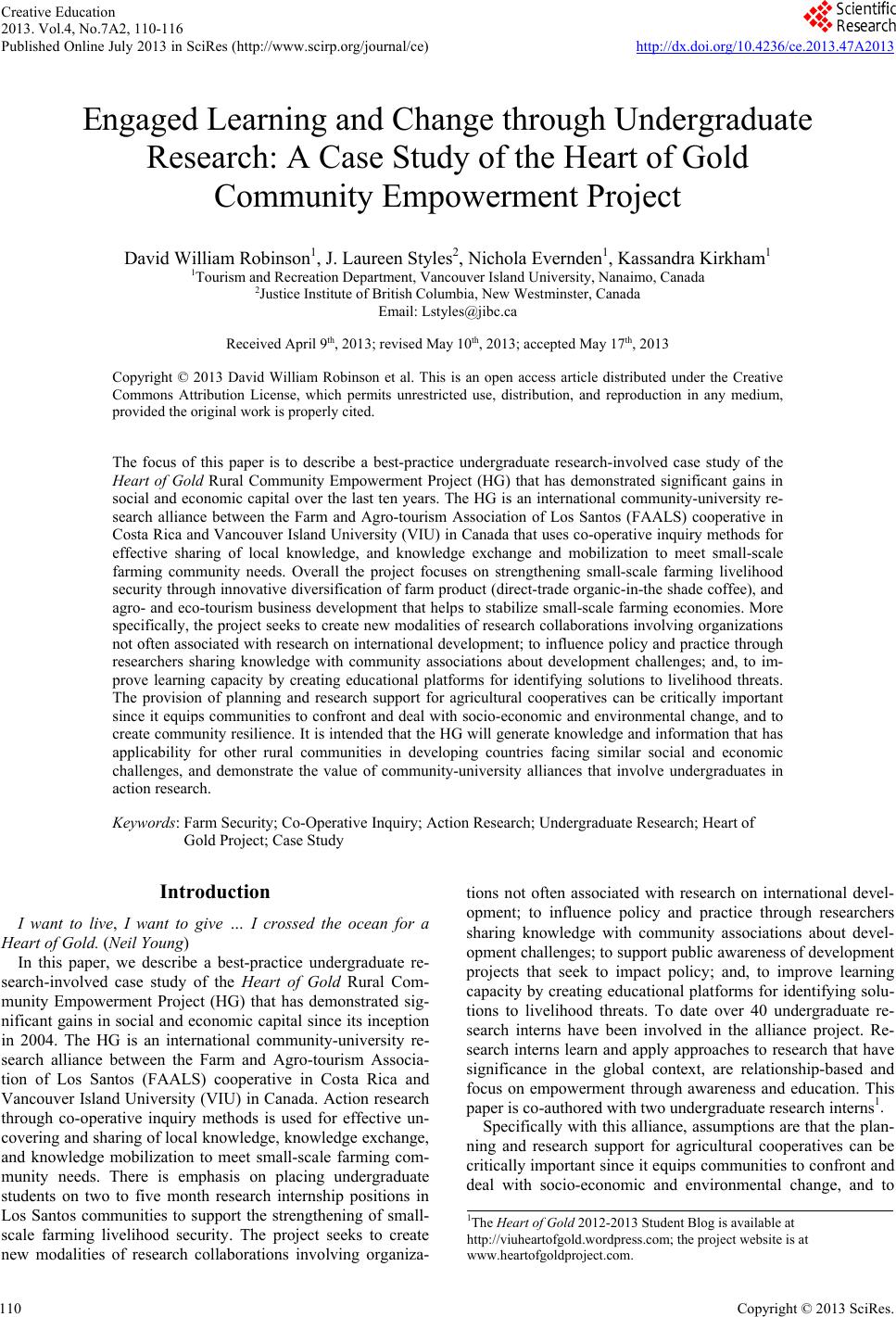 Creative Education 2013. Vol.4, No.7A2, 110-116 Published Online July 2013 in SciRes (http://www.scirp.org/journal/ce) http://dx.doi.org/10.4236/ce.2013.47A2013 Copyright © 2013 SciRes. 110 Engaged Learning and Change through Undergraduate Research: A Case Study of the Heart of Gold Community Empowerment Project David William Robinson1, J. Laureen St yles2, Nichola Evernden1, Kassandra Kirkham1 1Tourism and Recreation De p artment, Vancouver Island University, N a na i mo, Canada 2Justice Institute of British Columbia, New Westminster, Canada Email: Lstyles@jibc.ca Received April 9th, 2013; revised May 10th, 2013; accepted May 17th, 2013 Copyright © 2013 David William Robinson et al. This is an open access article distributed under the Creative Commons Attribution License, which permits unrestricted use, distribution, and reproduction in any medium, provided the origina l w o rk is properly cited. The focus of this paper is to describe a best-practice undergraduate research-involved case study of the Heart of Gold Rural Community Empowerment Project (HG) that has demonstrated significant gains in social and economic capital over the last ten years. The HG is an international community-university re- search alliance between the Farm and Agro-tourism Association of Los Santos (FAALS) cooperative in Costa Rica and Vancouver Island University (VIU) in Canada that uses co-operative inquiry methods for effective sharing of local knowledge, and knowledge exchange and mobilization to meet small-scale farming community needs. Overall the project focuses on strengthening small-scale farming livelihood security through innovative diversification of farm product (direct-trade organic-in-the shade coffee), and agro- and eco-tourism business development that helps to stabilize small-scale farming economies. More specifically, the project seeks to create new modalities of research collaborations involving organizations not often associated with research on international development; to influence policy and practice through researchers sharing knowledge with community associations about development challenges; and, to im- prove learning capacity by creating educational platforms for identifying solutions to livelihood threats. The provision of planning and research support for agricultural cooperatives can be critically important since it equips communities to confront and deal with socio-economic and environmental change, and to create community resilience. It is intended that the HG will generate knowledge and information that has applicability for other rural communities in developing countries facing similar social and economic challenges, and demonstrate the value of community-university alliances that involve undergraduates in action research. Keywords: Farm Security; Co-Operative Inquiry; Action Research; Undergraduate Research; Heart of Gold Project; Case Study Introduction I want to live, I want to give … I crossed the ocean for a Heart of Gold. (Neil Young) In this paper, we describe a best-practice undergraduate re- search-involved case study of the Heart of Gold Rural Com- munity Empowerment Project (HG) that has demonstrated sig- nificant gains in social and economic capital since its inception in 2004. The HG is an international community-university re- search alliance between the Farm and Agro-tourism Associa- tion of Los Santos (FAALS) cooperative in Costa Rica and Vancouver Island University (VIU) in Canada. Action research through co-operative inquiry methods is used for effective un- covering and sharing of local knowledge, knowledge exchange, and knowledge mobilization to meet small-scale farming com- munity needs. There is emphasis on placing undergraduate students on two to five month research internship positions in Los Santos communities to support the strengthening of small- scale farming livelihood security. The project seeks to create new modalities of research collaborations involving organiza- tions not often associated with research on international devel- opment; to influence policy and practice through researchers sharing knowledge with community associations about devel- opment challenges; to support public awareness of development projects that seek to impact policy; and, to improve learning capacity by creating educational platforms for identifying solu- tions to livelihood threats. To date over 40 undergraduate re- search interns have been involved in the alliance project. Re- search interns learn and apply approaches to research that have significance in the global context, are relationship-based and focus on empowerment through awareness and education. This paper is co-authored with two undergraduate research interns1. Specifically with this alliance, assumptions are that the plan- ning and research support for agricultural cooperatives can be critically important since it equips communities to confront and deal with socio-economic and environmental change, and to 1The Heart of Gold 2012-20 13 St ude nt B log is ava ila ble at http://viuheartofgold.wordpress.com; the project website is at www.heartofgoldproject.com. 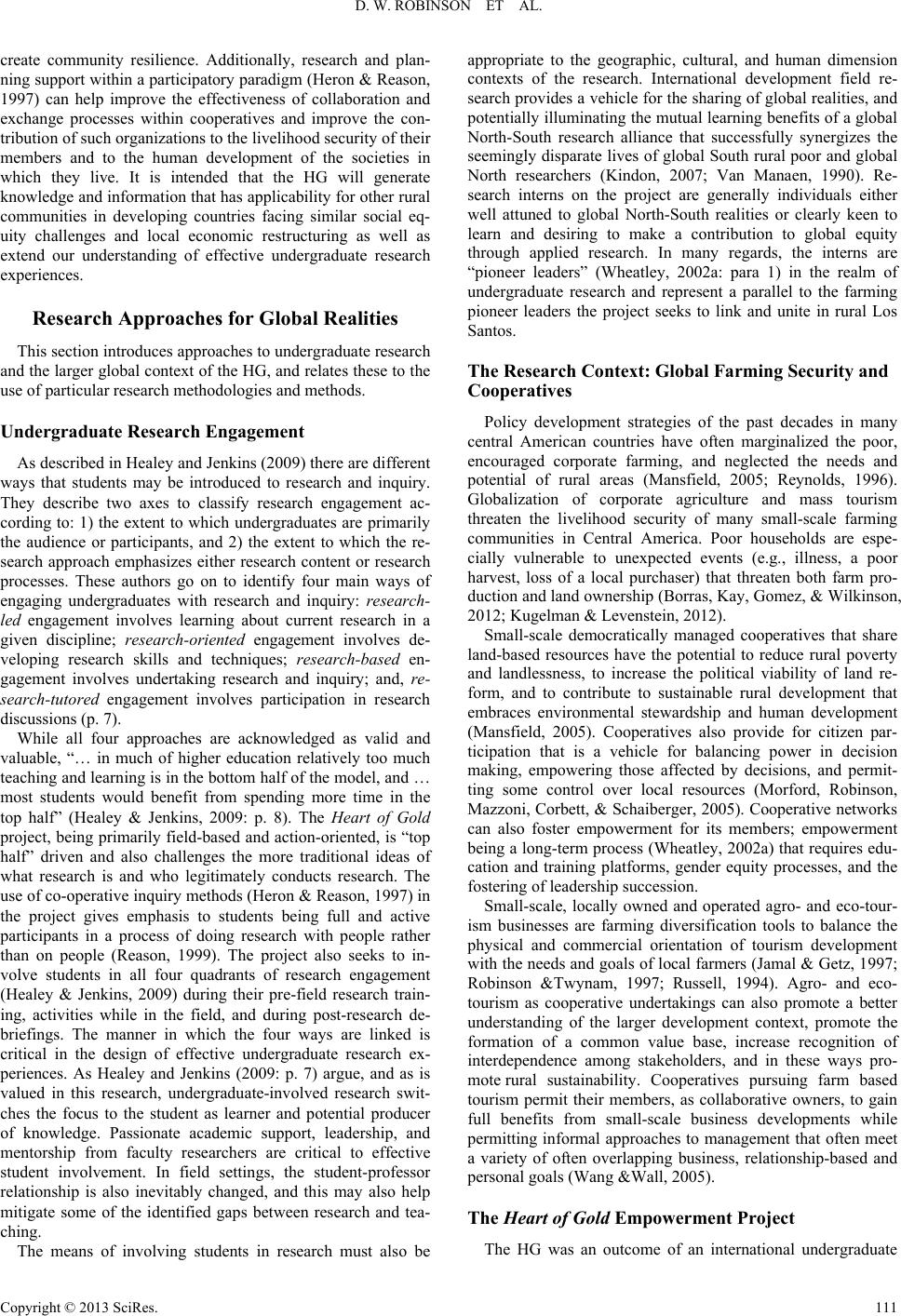 D. W. ROBINSON ET AL. create community resilience. Additionally, research and plan- ning support within a participatory paradigm (Heron & Reason, 1997) can help improve the effectiveness of collaboration and exchange processes within cooperatives and improve the con- tribution of such organizations to the livelihood security of their members and to the human development of the societies in which they live. It is intended that the HG will generate knowledge and information that has applicability for other rural communities in developing countries facing similar social eq- uity challenges and local economic restructuring as well as extend our understanding of effective undergraduate research experiences. Research Approaches for Global Realities This section introduces approaches to undergraduate research and the larger global conte xt of the HG, and relates t hese to the use of particular research methodologies and methods. Undergraduate Research Engagement As described in Healey and Jenkins (2009) there are different ways that students may be introduced to research and inquiry. They describe two axes to classify research engagement ac- cording to: 1) the extent to which undergraduates are primarily the audience or participants, and 2) the extent to which the re- search approach emphasizes either research content or research processes. These authors go on to identify four main ways of engaging undergraduates with research and inquiry: research- led engagement involves learning about current research in a given discipline; research-oriented engagement involves de- veloping research skills and techniques; research-based en- gagement involves undertaking research and inquiry; and, re- search-tutored engagement involves participation in research discussions (p. 7). While all four approaches are acknowledged as valid and valuable, “… in much of higher education relatively too much teaching and learning is in the bottom half of the model, and … most students would benefit from spending more time in the top half” (Healey & Jenkins, 2009: p. 8). The Heart of Gold project, being primarily field-based and action-oriented, is “top half” driven and also challenges the more traditional ideas of what research is and who legitimately conducts research. The use of co-operative inquiry methods (Heron & Reason, 1997) in the project gives emphasis to students being full and active participants in a process of doing research with people rather than on people (Reason, 1999). The project also seeks to in- volve students in all four quadrants of research engagement (Healey & Jenkins, 2009) during their pre-field research train- ing, activities while in the field, and during post-research de- briefings. The manner in which the four ways are linked is critical in the design of effective undergraduate research ex- periences. As Healey and Jenkins (2009: p. 7) argue, and as is valued in this research, undergraduate-involved research swit- ches the focus to the student as learner and potential producer of knowledge. Passionate academic support, leadership, and mentorship from faculty researchers are critical to effective student involvement. In field settings, the student-professor relationship is also inevitably changed, and this may also help mitigate some of the identified gaps between research and tea- ching. The means of involving students in research must also be appropriate to the geographic, cultural, and human dimension contexts of the research. International development field re- search provides a vehicle for the sharing of global realities, and potentially illuminating the mutual learning benefits of a global North-South research alliance that successfully synergizes the seemingly disparate lives of global South rural poor and global North researchers (Kindon, 2007; Van Manaen, 1990). Re- search interns on the project are generally individuals either well attuned to global North-South realities or clearly keen to learn and desiring to make a contribution to global equity through applied research. In many regards, the interns are “pioneer leaders” (Wheatley, 2002a: para 1) in the realm of undergraduate research and represent a parallel to the farming pioneer leaders the project seeks to link and unite in rural Los Santos. The Research Context: Global Farming Security and Cooperatives Policy development strategies of the past decades in many central American countries have often marginalized the poor, encouraged corporate farming, and neglected the needs and potential of rural areas (Mansfield, 2005; Reynolds, 1996). Globalization of corporate agriculture and mass tourism threaten the livelihood security of many small-scale farming communities in Central America. Poor households are espe- cially vulnerable to unexpected events (e.g., illness, a poor harvest, loss of a local purchaser) that threaten both farm pro- duction and land ownership (Borras, Kay, Gomez, & Wilkinson, 2012; Kugelman & Levenstein, 2012). Small-scale democratically managed cooperatives that share land-based resources have the potential to reduce rural poverty and landlessness, to increase the political viability of land re- form, and to contribute to sustainable rural development that embraces environmental stewardship and human development (Mansfield, 2005). Cooperatives also provide for citizen par- ticipation that is a vehicle for balancing power in decision making, empowering those affected by decisions, and permit- ting some control over local resources (Morford, Robinson, Mazzoni, Corbett, & Schaiberger, 2005). Cooperative networks can also foster empowerment for its members; empowerment being a long-term process (Wheatley, 2002a) that requires edu- cation and training platforms, gender equity processes, and the fostering of leadership succession. Small-scale, locally owned and operated agro- and eco-tour- ism businesses are farming diversification tools to balance the physical and commercial orientation of tourism development with the needs and goals of local farmers (Jamal & Getz, 1997; Robinson &Twynam, 1997; Russell, 1994). Agro- and eco- tourism as cooperative undertakings can also promote a better understanding of the larger development context, promote the formation of a common value base, increase recognition of interdependence among stakeholders, and in these ways pro- mote rural sustainability. Cooperatives pursuing farm based tourism permit their members, as collaborative owners, to gain full benefits from small-scale business developments while permitting informal approaches to management that often meet a variety of often overlapping business, relationship-based and personal goals (Wang &Wall, 2005). The Heart of Gold Empowerment Project The HG was an outcome of an international undergraduate Copyright © 2013 SciRes. 111 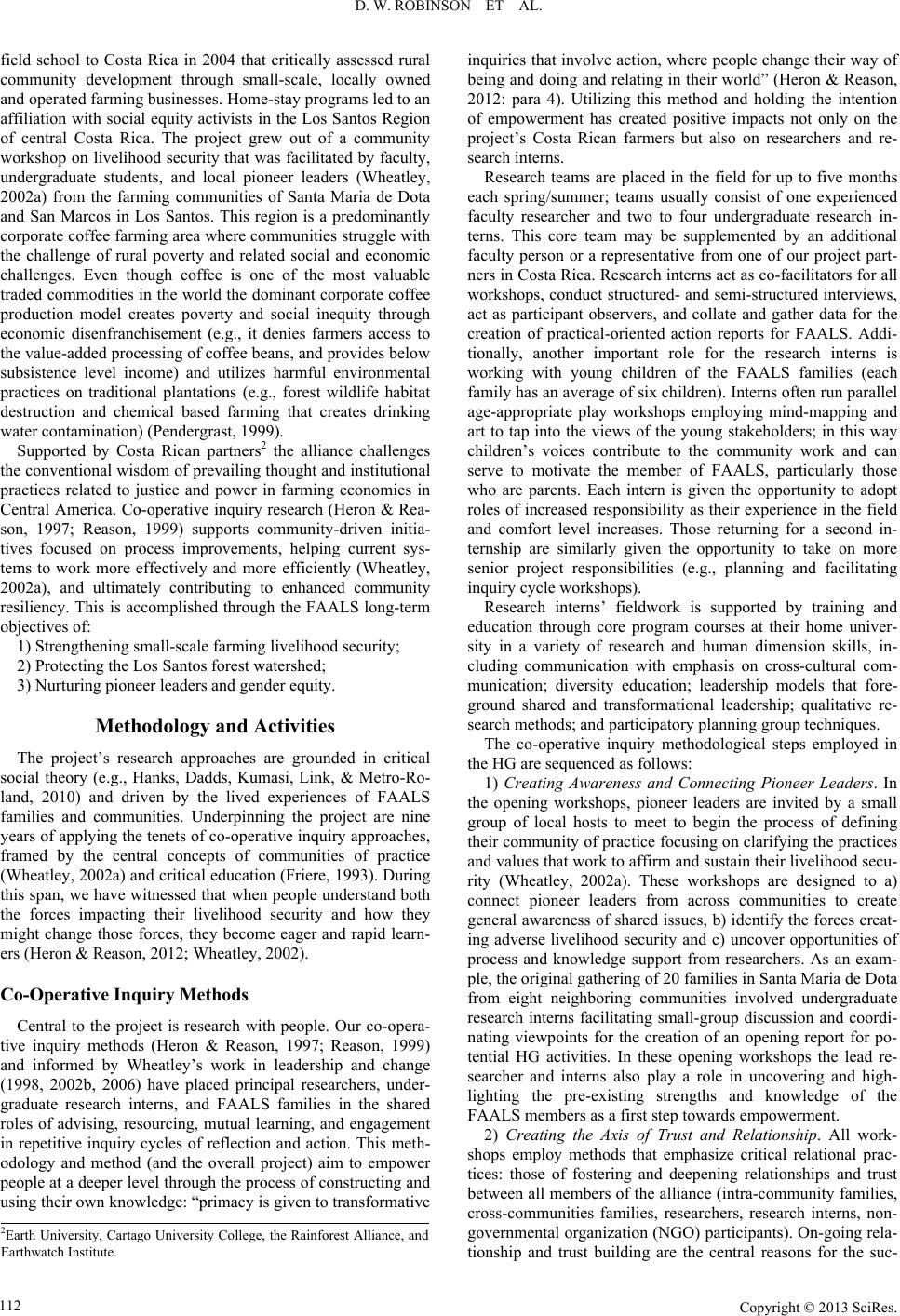 D. W. ROBINSON ET AL. field school to Costa Rica in 2004 that critically assessed rural community development through small-scale, locally owned and operated farming businesses. Home-stay programs led to an affiliation with social equity activists in the Los Santos Region of central Costa Rica. The project grew out of a community workshop on livelihood security that was facilitated by faculty, undergraduate students, and local pioneer leaders (Wheatley, 2002a) from the farming communities of Santa Maria de Dota and San Marcos in Los Santos. This region is a predominantly corporate coffee farming area where communities struggle with the challenge of rural poverty and related social and economic challenges. Even though coffee is one of the most valuable traded commodities in the world the dominant corporate coffee production model creates poverty and social inequity through economic disenfranchisement (e.g., it denies farmers access to the value-added processing of coffee beans, and provides below subsistence level income) and utilizes harmful environmental practices on traditional plantations (e.g., forest wildlife habitat destruction and chemical based farming that creates drinking water contamination) (Pendergrast, 1999). Supported by Costa Rican partners2 the alliance challenges the conventional wisdom of prevailing thought and institutional practices related to justice and power in farming economies in Central America. Co-operative inquiry research (Heron & Rea- son, 1997; Reason, 1999) supports community-driven initia- tives focused on process improvements, helping current sys- tems to work more effectively and more efficiently (Wheatley, 2002a), and ultimately contributing to enhanced community resiliency. This is accomplished through the FAALS long-term objectives of: 1) Strengthening small-scale farming livelihood security; 2) Protecting the Los Santos forest watershed; 3) Nurturing pioneer leaders and gender equity. Methodology and Activities The project’s research approaches are grounded in critical social theory (e.g., Hanks, Dadds, Kumasi, Link, & Metro-Ro- land, 2010) and driven by the lived experiences of FAALS families and communities. Underpinning the project are nine years of applying the tenets of co-operative inquiry approaches, framed by the central concepts of communities of practice (Wheatley, 2002a) and critical education (Friere, 1993). During this span, we have witnessed that when people understand both the forces impacting their livelihood security and how they might change those forces, they become eager and rapid learn- ers (Heron & Reason, 2012; Wheatley, 2002). Co-Operative Inquiry Metho ds Central to the project is research with people. Our co-opera- tive inquiry methods (Heron & Reason, 1997; Reason, 1999) and informed by Wheatley’s work in leadership and change (1998, 2002b, 2006) have placed principal researchers, under- graduate research interns, and FAALS families in the shared roles of advising, resourcing, mutual learning, and engagement in repetitive inquiry cycles of reflection and action. This meth- odology and method (and the overall project) aim to empower people at a deeper level through the process of constructing and using their own knowledge: “primacy is given to transformative inquiries that involve action, where people change their way of being and doing and relating in their world” (Heron & Reason, 2012: para 4). Utilizing this method and holding the intention of empowerment has created positive impacts not only on the project’s Costa Rican farmers but also on researchers and re- search interns. Research teams are placed in the field for up to five months each spring/summer; teams usually consist of one experienced faculty researcher and two to four undergraduate research in- terns. This core team may be supplemented by an additional faculty person or a representative from one of our project part- ners in Costa Rica. Research interns act as co-facilitators for all workshops, conduct structured- and semi-structured interviews, act as participant observers, and collate and gather data for the creation of practical-oriented action reports for FAALS. Addi- tionally, another important role for the research interns is working with young children of the FAALS families (each family has an average of six children). Interns often run parallel age-appropriate play workshops employing mind-mapping and art to tap into the views of the young stakeholders; in this way children’s voices contribute to the community work and can serve to motivate the member of FAALS, particularly those who are parents. Each intern is given the opportunity to adopt roles of increased responsibility as their experience in the field and comfort level increases. Those returning for a second in- ternship are similarly given the opportunity to take on more senior project responsibilities (e.g., planning and facilitating inquiry cycle workshops). Research interns’ fieldwork is supported by training and education through core program courses at their home univer- sity in a variety of research and human dimension skills, in- cluding communication with emphasis on cross-cultural com- munication; diversity education; leadership models that fore- ground shared and transformational leadership; qualitative re- search methods; and participatory planning group techniques. The co-operative inquiry methodological steps employed in the HG are sequenced as follows: 1) Creating Awareness and Connecting Pioneer Leaders. In the opening workshops, pioneer leaders are invited by a small group of local hosts to meet to begin the process of defining their community of practice focusing on clarifying the practices and values that work to affirm and sustain their livelihood secu- rity (Wheatley, 2002a). These workshops are designed to a) connect pioneer leaders from across communities to create general awareness of shared issues, b) identify the forces creat- ing adverse livelihood security and c) uncover opportunities of process and knowledge support from researchers. As an exam- ple, the original gathering of 20 families in Santa Maria de Dota from eight neighboring communities involved undergraduate research interns facilitating small-group discussion and coordi- nating viewpoints for the creation of an opening report for po- tential HG activities. In these opening workshops the lead re- searcher and interns also play a role in uncovering and high- lighting the pre-existing strengths and knowledge of the FAALS members as a first step towards empowerment. 2) Creating the Axis of Trust and Relationship. All work- shops employ methods that emphasize critical relational prac- tices: those of fostering and deepening relationships and trust between all membe rs of the alliance (intra -community famil ies, cross-communities families, researchers, research interns, non- governmental organization (NGO) participants). On-going rela- tionship and trust building are the central reasons for the suc- 2Earth University, Cartago University College, the Rainforest Alliance, and Earthwatch Institute. Copyright © 2013 SciRes. 112 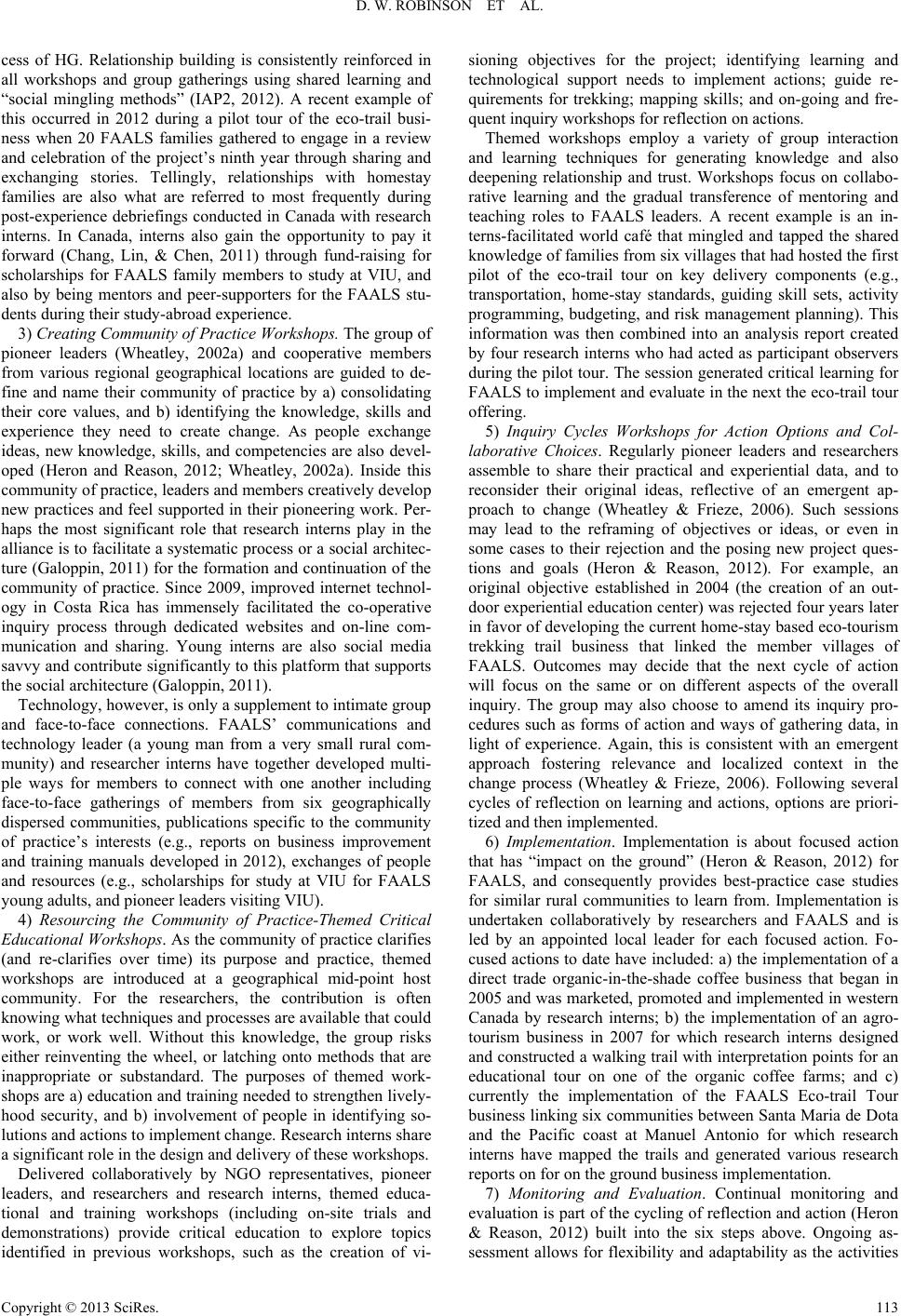 D. W. ROBINSON ET AL. cess of HG. Relationship building is consistently reinforced in all workshops and group gatherings using shared learning and “social mingling methods” (IAP2, 2012). A recent example of this occurred in 2012 during a pilot tour of the eco-trail busi- ness when 20 FAALS families gathered to engage in a review and celebration of the project’s ninth year through sharing and exchanging stories. Tellingly, relationships with homestay families are also what are referred to most frequently during post-experience debriefings conducted in Canada with research interns. In Canada, interns also gain the opportunity to pay it forward (Chang, Lin, & Chen, 2011) through fund-raising for scholarships for FAALS family members to study at VIU, and also by being mentors and peer-supporters for the FAALS stu- dents during their study-abroad experience. 3) Creating Community of Practice Workshops. The group of pioneer leaders (Wheatley, 2002a) and cooperative members from various regional geographical locations are guided to de- fine and name their community of practice by a) consolidating their core values, and b) identifying the knowledge, skills and experience they need to create change. As people exchange ideas, new knowledge, skills, and competencies are also devel- oped (Heron and Reason, 2012; Wheatley, 2002a). Inside this community of practice, leaders and members creatively develop new practices and feel supported in their pioneering work. Per- haps the most significant role that research interns play in the alliance is to facilitate a systematic process or a social architec- ture (Galoppin, 2011) for the formation and continuation of the community of practice. Since 2009, improved internet technol- ogy in Costa Rica has immensely facilitated the co-operative inquiry process through dedicated websites and on-line com- munication and sharing. Young interns are also social media savvy and contribute significantly to this platform that supports the social architecture (Galoppin, 2011). Technology, however, is only a supplement to intimate group and face-to-face connections. FAALS’ communications and technology leader (a young man from a very small rural com- munity) and researcher interns have together developed multi- ple ways for members to connect with one another including face-to-face gatherings of members from six geographically dispersed communities, publications specific to the community of practice’s interests (e.g., reports on business improvement and training manuals developed in 2012), exchanges of people and resources (e.g., scholarships for study at VIU for FAALS young adults, and pioneer leaders visiting VIU). 4) Resourcing the Community of Practice-Themed Critical Educational Workshops. As the community of practice clarifies (and re-clarifies over time) its purpose and practice, themed workshops are introduced at a geographical mid-point host community. For the researchers, the contribution is often knowing what techniques and processes are available that could work, or work well. Without this knowledge, the group risks either reinventing the wheel, or latching onto methods that are inappropriate or substandard. The purposes of themed work- shops are a) education and training needed to strengthen lively- hood security, and b) involvement of people in identifying so- lutions and actions to implement change. Research interns share a significant role in the design and delivery of these workshops. Delivered collaboratively by NGO representatives, pioneer leaders, and researchers and research interns, themed educa- tional and training workshops (including on-site trials and demonstrations) provide critical education to explore topics identified in previous workshops, such as the creation of vi- sioning objectives for the project; identifying learning and technological support needs to implement actions; guide re- quirements for trekking; mapping skills; and on-going and fre- quent inquiry workshops for reflection on actions. Themed workshops employ a variety of group interaction and learning techniques for generating knowledge and also deepening relationship and trust. Workshops focus on collabo- rative learning and the gradual transference of mentoring and teaching roles to FAALS leaders. A recent example is an in- terns-facilitated world café that mingled and tapped the shared knowledge of families from six villages that had hosted the first pilot of the eco-trail tour on key delivery components (e.g., transportation, home-stay standards, guiding skill sets, activity programming, budgeting, and risk management planning). This information was then combined into an analysis report created by four research interns who had acted as participant observers during the pilot tour. The session generated critical learning for FAALS to implement and evaluate in the next the eco-trail tour offering. 5) Inquiry Cycles Workshops for Action Options and Col- laborative Choices. Regularly pioneer leaders and researchers assemble to share their practical and experiential data, and to reconsider their original ideas, reflective of an emergent ap- proach to change (Wheatley & Frieze, 2006). Such sessions may lead to the reframing of objectives or ideas, or even in some cases to their rejection and the posing new project ques- tions and goals (Heron & Reason, 2012). For example, an original objective established in 2004 (the creation of an out- door experiential education center) was rejected four years later in favor of developing the current home-stay based eco-tourism trekking trail business that linked the member villages of FAALS. Outcomes may decide that the next cycle of action will focus on the same or on different aspects of the overall inquiry. The group may also choose to amend its inquiry pro- cedures such as forms of action and ways of gathering data, in light of experience. Again, this is consistent with an emergent approach fostering relevance and localized context in the change process (Wheatley & Frieze, 2006). Following several cycles of reflection on learning and actions, options are priori- tized and then implemented. 6) Implementation. Implementation is about focused action that has “impact on the ground” (Heron & Reason, 2012) for FAALS, and consequently provides best-practice case studies for similar rural communities to learn from. Implementation is undertaken collaboratively by researchers and FAALS and is led by an appointed local leader for each focused action. Fo- cused actions to date have included: a) the implementation of a direct trade organic-in-the-shade coffee business that began in 2005 and was marketed, promoted and implemented in western Canada by research interns; b) the implementation of an agro- tourism business in 2007 for which research interns designed and constructed a walking trail with interpretation points for an educational tour on one of the organic coffee farms; and c) currently the implementation of the FAALS Eco-trail Tour business linking six communities between Santa Maria de Dota and the Pacific coast at Manuel Antonio for which research interns have mapped the trails and generated various research reports on for on the ground business implementation. 7) Monitoring and Evaluation. Continual monitoring and evaluation is part of the cycling of reflection and action (Heron & Reason, 2012) built into the six steps above. Ongoing as- sessment allows for flexibility and adaptability as the activities Copyright © 2013 SciRes. 113 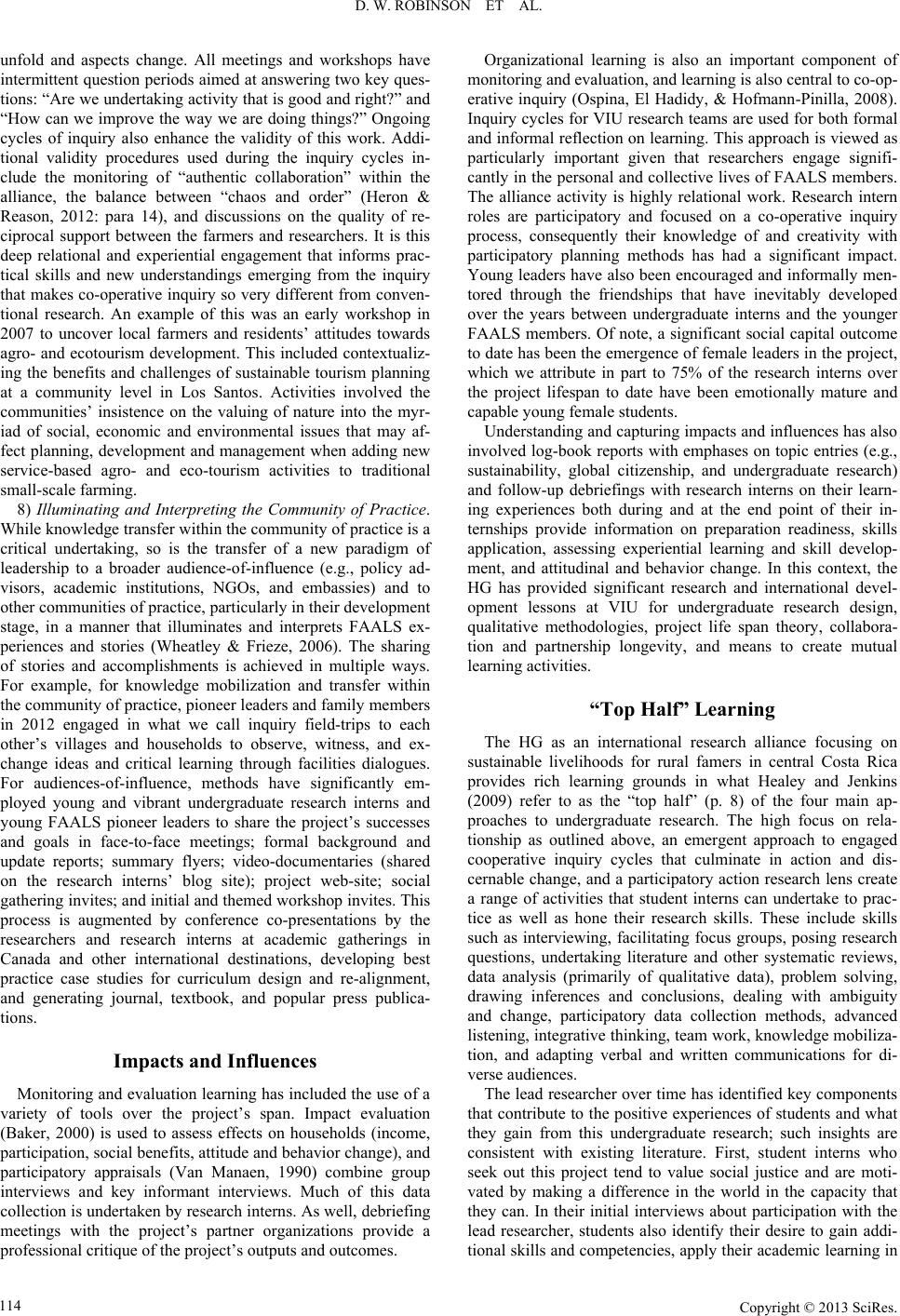 D. W. ROBINSON ET AL. unfold and aspects change. All meetings and workshops have intermittent question periods aimed at answering two key ques- tions: “Are we undertaking activity that is good and right?” and “How can we improve the way we are doing things?” Ongoing cycles of inquiry also enhance the validity of this work. Addi- tional validity procedures used during the inquiry cycles in- clude the monitoring of “authentic collaboration” within the alliance, the balance between “chaos and order” (Heron & Reason, 2012: para 14), and discussions on the quality of re- ciprocal support between the farmers and researchers. It is this deep relational and experiential engagement that informs prac- tical skills and new understandings emerging from the inquiry that makes co-operative inquiry so very different from conven- tional research. An example of this was an early workshop in 2007 to uncover local farmers and residents’ attitudes towards agro- and ecotourism development. This included contextualiz- ing the benefits and challenges of sustainable tourism planning at a community level in Los Santos. Activities involved the communities’ insistence on the valuing of nature into the myr- iad of social, economic and environmental issues that may af- fect planning, development and management when adding new service-based agro- and eco-tourism activities to traditional small-scale farming. 8) Illuminating and Interpreting the Community of Practice. While knowledge transfer within the community of practice is a critical undertaking, so is the transfer of a new paradigm of leadership to a broader audience-of-influence (e.g., policy ad- visors, academic institutions, NGOs, and embassies) and to other communities of practice, particularly in their development stage, in a manner that illuminates and interprets FAALS ex- periences and stories (Wheatley & Frieze, 2006). The sharing of stories and accomplishments is achieved in multiple ways. For example, for knowledge mobilization and transfer within the community of practice, pioneer leaders and family members in 2012 engaged in what we call inquiry field-trips to each other’s villages and households to observe, witness, and ex- change ideas and critical learning through facilities dialogues. For audiences-of-influence, methods have significantly em- ployed young and vibrant undergraduate research interns and young FAALS pioneer leaders to share the project’s successes and goals in face-to-face meetings; formal background and update reports; summary flyers; video-documentaries (shared on the research interns’ blog site); project web-site; social gathering invites; and initial and themed workshop invites. This process is augmented by conference co-presentations by the researchers and research interns at academic gatherings in Canada and other international destinations, developing best practice case studies for curriculum design and re-alignment, and generating journal, textbook, and popular press publica- tions. Impacts and Influences Monitoring and evaluation learning has included the use of a variety of tools over the project’s span. Impact evaluation (Baker, 2000) is used to assess effects on households (income, participation, social benefits, attitude and behavior change), and participatory appraisals (Van Manaen, 1990) combine group interviews and key informant interviews. Much of this data collection is undertaken by research interns. As well, debriefing meetings with the project’s partner organizations provide a professional critique of the project’s outputs and outcomes. Organizational learning is also an important component of monitoring and e v al uation, and l ea rning is also central to co-op- erative inquiry (Ospina, El Hadidy, & Hofmann-Pinilla, 2008). Inquiry cycles for VIU research teams are used for both formal and informal reflection on learning. This approach is viewed as particularly important given that researchers engage signifi- cantly in the personal and collective lives of FAALS members. The alliance activity is highly relational work. Research intern roles are participatory and focused on a co-operative inquiry process, consequently their knowledge of and creativity with participatory planning methods has had a significant impact. Young leaders have also been encouraged and informally men- tored through the friendships that have inevitably developed over the years between undergraduate interns and the younger FAALS members. Of note, a significant social capital outcome to date has been the emergence of female leaders in the project, which we attribute in part to 75% of the research interns over the project lifespan to date have been emotionally mature and capable young female students. Understanding and capturing impacts and influences has also involved log-book reports with emphases on topic entries (e.g., sustainability, global citizenship, and undergraduate research) and follow-up debriefings with research interns on their learn- ing experiences both during and at the end point of their in- ternships provide information on preparation readiness, skills application, assessing experiential learning and skill develop- ment, and attitudinal and behavior change. In this context, the HG has provided significant research and international devel- opment lessons at VIU for undergraduate research design, qualitative methodologies, project life span theory, collabora- tion and partnership longevity, and means to create mutual learning activities. “Top Half” Learning The HG as an international research alliance focusing on sustainable livelihoods for rural famers in central Costa Rica provides rich learning grounds in what Healey and Jenkins (2009) refer to as the “top half” (p. 8) of the four main ap- proaches to undergraduate research. The high focus on rela- tionship as outlined above, an emergent approach to engaged cooperative inquiry cycles that culminate in action and dis- cernable change, and a participatory action research lens create a range of activities that student interns can undertake to prac- tice as well as hone their research skills. These include skills such as interviewing, facilitating focus groups, posing research questions, undertaking literature and other systematic reviews, data analysis (primarily of qualitative data), problem solving, drawing inferences and conclusions, dealing with ambiguity and change, participatory data collection methods, advanced listening, integrative thinking, team work, knowledge mobiliza- tion, and adapting verbal and written communications for di- verse audiences. The lead researcher over time has identified key components that contribute to the positive experiences of students and what they gain from this undergraduate research; such insights are consistent with existing literature. First, student interns who seek out this project tend to value social justice and are moti- vated by making a difference in the world in the capacity that they can. In their initial interviews about participation with the lead researcher, students also identify their desire to gain addi- tional skills and competencies, apply their academic learning in Copyright © 2013 SciRes. 114 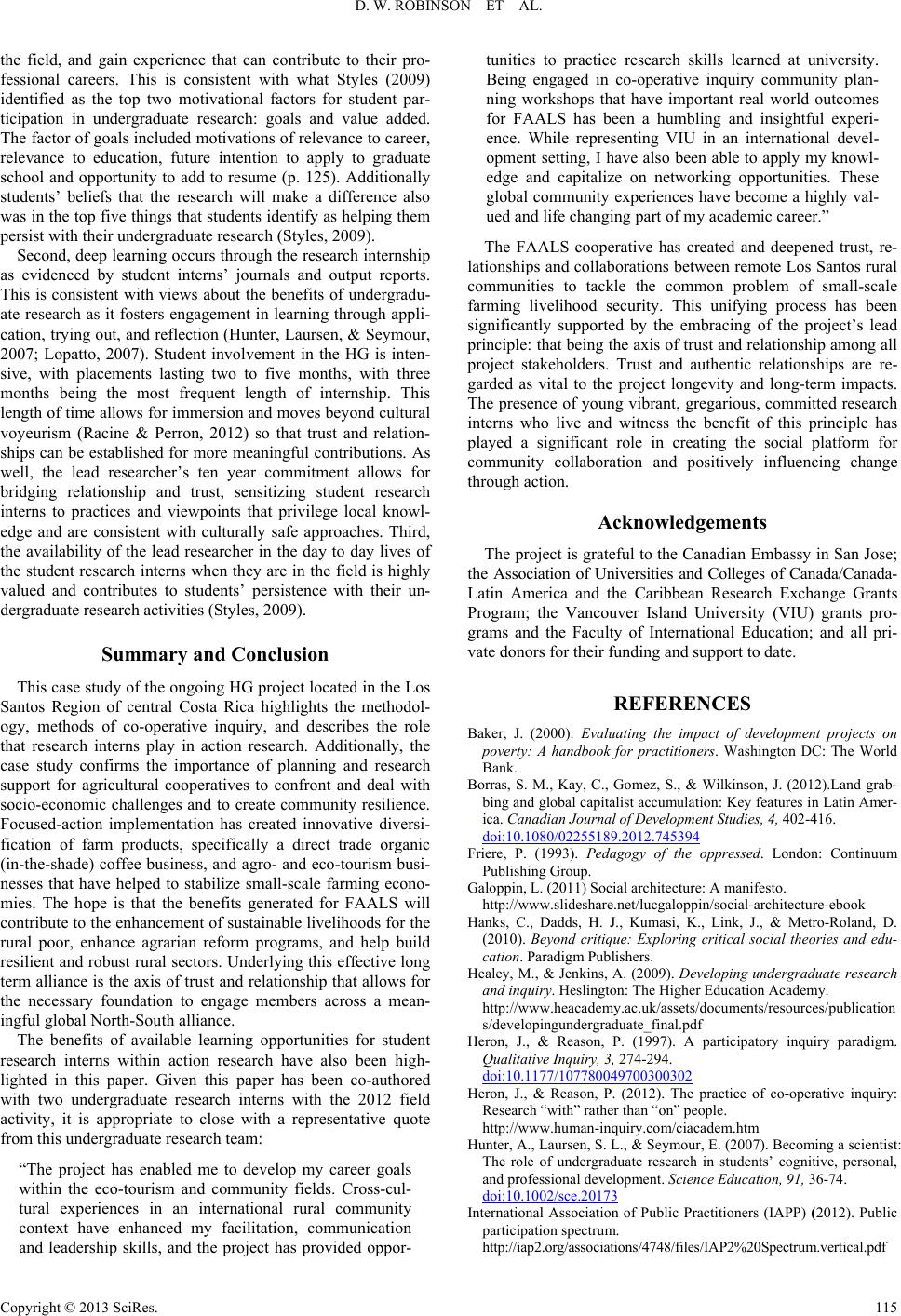 D. W. ROBINSON ET AL. the field, and gain experience that can contribute to their pro- fessional careers. This is consistent with what Styles (2009) identified as the top two motivational factors for student par- ticipation in undergraduate research: goals and value added. The factor of goals included motivations of relevance to career, relevance to education, future intention to apply to graduate school and opportunity to add to resume (p. 125). Additionally students’ beliefs that the research will make a difference also was in the top five things that students identify as helping them persist with their undergraduate research (Styles, 2009). Second, deep learning occurs through the research internship as evidenced by student interns’ journals and output reports. This is consistent with views about the benefits of undergradu- ate research as it fosters engagement in learning through appli- cation, trying out, and reflection (Hunter, Laursen, & Seymour, 2007; Lopatto, 2007). Student involvement in the HG is inten- sive, with placements lasting two to five months, with three months being the most frequent length of internship. This length of time allows for immersion and moves beyond cultural voyeurism (Racine & Perron, 2012) so that trust and relation- ships can be established for more meaningful contributions. As well, the lead researcher’s ten year commitment allows for bridging relationship and trust, sensitizing student research interns to practices and viewpoints that privilege local knowl- edge and are consistent with culturally safe approaches. Third, the availability of the lead researcher in the day to day lives of the student research interns when they are in the field is highly valued and contributes to students’ persistence with their un- dergraduate research activities (Styles, 2009). Summary and Conclusion This case study of the ongoing HG project located in the Los Santos Region of central Costa Rica highlights the methodol- ogy, methods of co-operative inquiry, and describes the role that research interns play in action research. Additionally, the case study confirms the importance of planning and research support for agricultural cooperatives to confront and deal with socio-economic challenges and to create community resilience. Focused-action implementation has created innovative diversi- fication of farm products, specifically a direct trade organic (in-the-shade) coffee business, and agro- and eco-tourism busi- nesses that have helped to stabilize small-scale farming econo- mies. The hope is that the benefits generated for FAALS will contribute to the enhancement of sustainable livelihoods for the rural poor, enhance agrarian reform programs, and help build resilient and robust rural sectors. Underlying this effective long term alliance is the axis of trust and relationship that allows for the necessary foundation to engage members across a mean- ingful global North-South alliance. The benefits of available learning opportunities for student research interns within action research have also been high- lighted in this paper. Given this paper has been co-authored with two undergraduate research interns with the 2012 field activity, it is appropriate to close with a representative quote from this undergraduate research team: “The project has enabled me to develop my career goals within the eco-tourism and community fields. Cross-cul- tural experiences in an international rural community context have enhanced my facilitation, communication and leadership skills, and the project has provided oppor- tunities to practice research skills learned at university. Being engaged in co-operative inquiry community plan- ning workshops that have important real world outcomes for FAALS has been a humbling and insightful experi- ence. While representing VIU in an international devel- opment setting, I have also been able to apply my knowl- edge and capitalize on networking opportunities. These global community experiences have become a highly val- ued and life changing part of my academic career.” The FAALS cooperative has created and deepened trust, re- lationships and collaborations between remote Los Santos rural communities to tackle the common problem of small-scale farming livelihood security. This unifying process has been significantly supported by the embracing of the project’s lead principle: that being the axis of trust and relationship among all project stakeholders. Trust and authentic relationships are re- garded as vital to the project longevity and long-term impacts. The presence of young vibrant, gregarious, committed research interns who live and witness the benefit of this principle has played a significant role in creating the social platform for community collaboration and positively influencing change through action. Acknowledgements The project is grateful to the Canadian Embassy in San Jose; the Association of Universities and Colleges of Canada/Canada- Latin America and the Caribbean Research Exchange Grants Program; the Vancouver Island University (VIU) grants pro- grams and the Faculty of International Education; and all pri- vate donors for their funding and support to date. REFERENCES Baker, J. (2000). Evaluating the impact of development projects on poverty: A handbook for practitioners. Washington DC: The World Bank. Borras, S. M., Kay, C., Gomez, S., & Wilkinson, J. (2012).Land grab- bing and global capitalist accumulation: Key features in Latin Amer- ica. Canadian Journal of Development Studies, 4, 402-416. doi:10.1080/02255189.2012.745394 Friere, P. (1993). Pedagogy of the oppressed. London: Continuum Publishing Group. Galoppin, L. (2011 ) Social architecture: A man i f e s t o . http://www.slideshare.net/lucgaloppin/social-architecture-ebook Hanks, C., Dadds, H. J., Kumasi, K., Link, J., & Metro-Roland, D. (2010). Beyond critique: Exploring critical social theories and edu- cation. Paradigm Pu bl i sh e rs. Healey, M., & Jenkins, A. (2009). Developing undergraduate research and inquiry. Heslington: The Higher Education Academy. http://www.heacademy.ac.uk/assets/documents/resources/publication s/developingundergraduate_final.pdf Heron, J., & Reason, P. (1997). A participatory inquiry paradigm. Qualitative Inquiry, 3, 274-294. doi:10.1177/107780049700300302 Heron, J., & Reason, P. (2012). The practice of co-operative inquiry: Research “with” rather than “on” people. http://www.human-inquiry.com/ciacadem.htm Hunter, A., Laursen, S. L., & Seymour, E. (2007). Becoming a scientist: The role of undergraduate research in students’ cognitive, personal, and professional development. Science Edu ca t i o n, 91, 36-74. doi:10.1002/sce.20173 International Association of Public Practitioners (IAPP) (2012). Public participation spectrum. http://iap2.org/associations/4748/files/IAP2%20 Spectru m.vertical.pdf Copyright © 2013 SciRes. 115 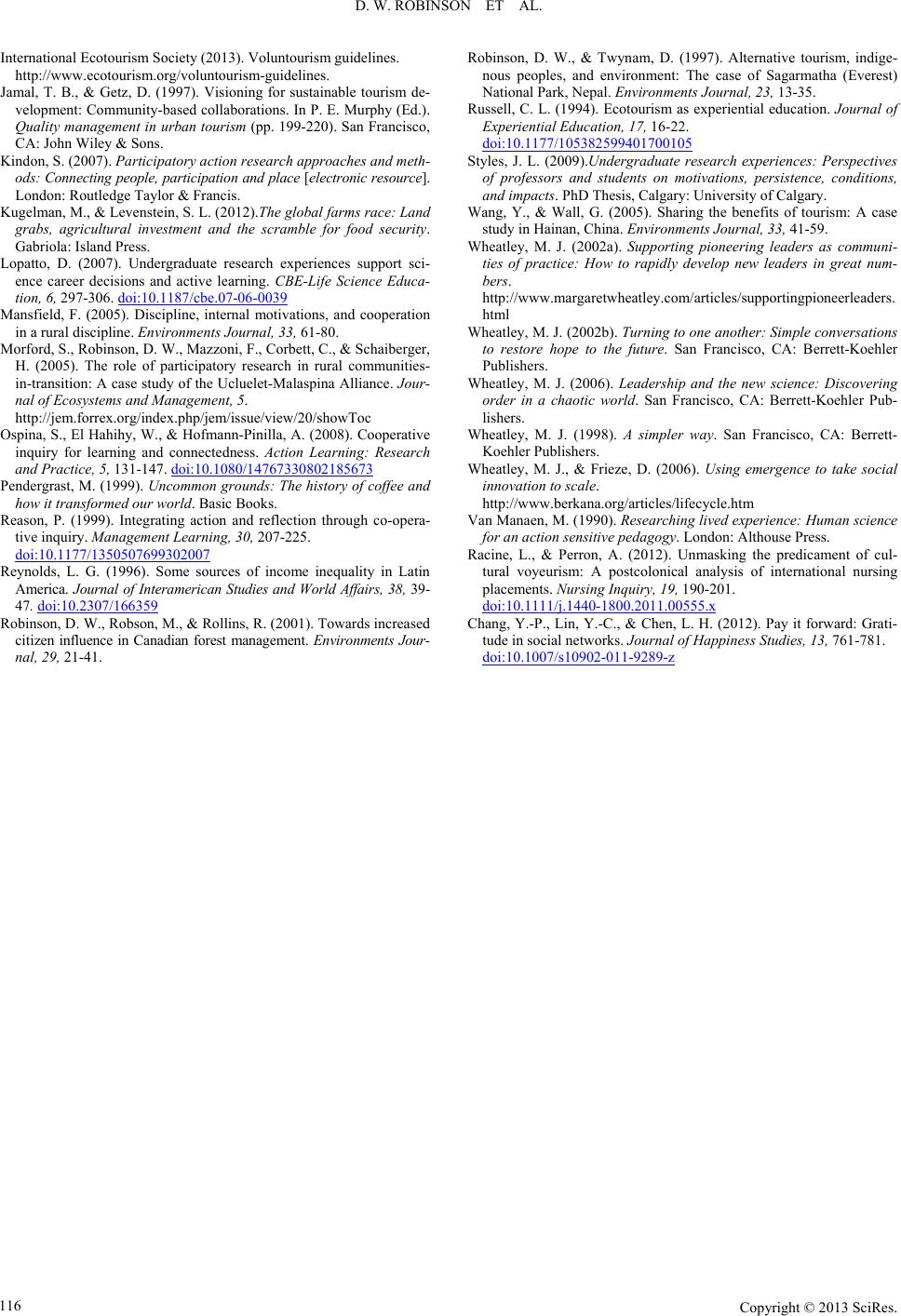 D. W. ROBINSON ET AL. Copyright © 2013 SciRes. 116 International Ecotourism Society (2013). V o l un t o u rism guidelines. http://www.ecotourism.org/voluntourism-guidelines. Jamal, T. B., & Getz, D. (1997). Visioning for sustainable tourism de- velopment: Community-based collaborations. In P. E. Murphy (Ed.). Quality management in urban tourism (pp. 199-220). San Francisco, CA: John Wiley & Sons. Kindon, S. (2007). Participatory action research approaches and meth- ods: Connecting people, participation and place [electronic resou rce]. London: Routledge Tay lor & Francis. Kugelman, M., & Levenstein, S. L. (2012).The global farms race: Land grabs, agricultural investment and the scramble for food security. Gabriola: Island Press. Lopatto, D. (2007). Undergraduate research experiences support sci- ence career decisions and active learning. CBE-Life Science Educa- tion, 6, 297-306. doi:10.1187/cbe.07-06-0039 Mansfield, F. (2005). Discipline, internal motivations, and cooperation in a rural discipline. Environments Journal, 33, 61-80. Morford, S., Robinson, D. W., Mazzoni, F., Corbett, C., & Schaiberger, H. (2005). The role of participatory research in rural communities- in-transition: A case study of the Ucluelet-Malaspina Alliance. Jour- nal of Ecosystems and Management, 5. http://jem.forrex.org/index.php/jem/issue/view/20/showToc Ospina, S., El Hahihy, W., & Hofmann-Pinilla, A. (2008). Cooperative inquiry for learning and connectedness. Action Learning: Research and Practice, 5, 131-147. doi:10.1080/14767330802185673 Pendergrast, M. (1999). Uncommon grounds: The history of coffee and how it transformed our world. Basic Books. Reason, P. (1999). Integrating action and reflection through co-opera- tive inquiry. M an ag eme nt L ea rn in g, 30, 207-225. doi:10.1177/1350507699302007 Reynolds, L. G. (1996). Some sources of income inequality in Latin America. Journal of Interamerican S tudies and World Affairs, 38, 39- 47. doi:10.2307/166359 Robinson, D. W., Robson, M., & Rollins, R. (2001). Towards increased citizen influence in Canadian forest management. Environments Jour- nal, 29, 21-41. Robinson, D. W., & Twynam, D. (1997). Alternative tourism, indige- nous peoples, and environment: The case of Sagarmatha (Everest) National Park, Nepal. Environments Journal, 23, 13-35. Russell, C. L. (1994). Ecotourism as experiential education. Journal of Experiential Education, 1 7 , 16-22. doi:10.1177/105382599401700105 Styles, J. L. (2009).Undergraduate research experiences: Perspectives of professors and students on motivations, persistence, conditions, and impacts. PhD Thesis, Calgary: University of Calgary. Wang, Y., & Wall, G. (2005). Sharing the benefits of tourism: A case study in Hainan, China. Environments Journal, 33, 41-59. Wheatley, M. J. (2002a). Supporting pioneering leaders as communi- ties of practice: How to rapidly develop new leaders in great num- bers. http://www.margaretwheatley.com/articles/supportingpioneerleaders. html Wheatley, M. J. (2002b). Turning to one another: Simple conversations to restore hope to the future. San Francisco, CA: Berrett-Koehler Publishers. Wheatley, M. J. (2006). Leadership and the new science: Discovering order in a chaotic world. San Francisco, CA: Berrett-Koehler Pub- lishers. Wheatley, M. J. (1998). A simpler way. San Francisco, CA: Berrett- Koehler Publishers. Wheatley, M. J., & Frieze, D. (2006). Using emergence to take social innovation to scale. http://www.berkana.org/articles/lifecycle.htm Van Manaen, M. (1990). Researching lived experience: Human science for an action sensitive peda go g y. London: Althouse Press. Racine, L., & Perron, A. (2012). Unmasking the predicament of cul- tural voyeurism: A postcolonical analysis of international nursing placements. Nursing Inquiry, 19, 190-201. doi:10.1111/j.1440-1800.2011.00555.x Chang, Y.-P., Lin, Y.-C., & Chen, L. H. (2012). Pay it forward: Grati- tude in social networks. Journal of Happiness Studies, 13, 761- 781. doi:10.1007/s10902-011-9289-z
|